Practicing survival self-care during the COVID-19 pandemic

My parents were children when the Second World War broke out. They were both separated from their parents, lived through rationing, and regularly woke up to bombed-out streets. Although they didn't talk much about the hardships until we were much older, their early lives would have been considered in many ways, horrific by modern standards.
Looking back at my parent's time during the war, I know that their focus was simply on getting through the day. The battle was a signal that they were in a crisis and survival was key.
We may not be facing the same wartime violence, but the COVID-19 pandemic is a massive global change, and we are facing uncertainty, financial worries, and a growing list of causalities; there is still an enemy lurking.
We're all trying to find ways to get through this, and if you're anything like me, you might find yourself in a cycle of consuming. Consuming lots of unnecessary news feeds, way too much Netflix, and snacking on all sorts of things that wouldn't usually make it into my diet. And you know what? That's pretty normal in this highly abnormal time.
I have devoted my almost 30-year career to encouraging people to become healthier, change their lifestyles for the better, and to reduce their chronic disease risk - I'm here to advocate that what we truly need now is more self-compassion and essential self-care.
Women in middle-age and beyond already carry a significant mental load and are responsible for the bulk of informal caregiving (i.e., unpaid work). In times of crisis, we will naturally gravitate towards putting ourselves last to make sure everyone else is okay.
It's also easy to fall into the trap of telling yourself that you shouldn't feel bad when others seem to be worse off, but I believe loss exists on a continuum. Just losing the freedom to go outside, hug a friend, or gather in groups is significant. For those who have lost love ones, lost income or work, or are sick themselves, the loss becomes even more devastating.
On top of dealing with the quarantine, we seem to be faced with a lot of messages that we should be working on self-improvement. There is a strange shift in some of the recent online advice towards "taking this opportunity" to improve ourselves, diet, or otherwise fill space with becoming "better." I wrote a post a few weeks ago about exercising from home, but I want to be clear - at this moment in time, I am suggesting we shift to a survival-type self-care; this crisis doesn't need to be an opportunity to try to be the best versions of ourselves.
So, let's just work on a program of radical self-compassion. Here's what I'm going to try to do in the next few weeks, and I invite you to join me:
- Keep my routine. A routine is one thing that helps to keep our brains grounded in times of uncertainty. Make sure your daily schedule is light on the drudgery and heavy on comforts.
- Move every day. From spending many years working with folks with mood disorders, I can tell you that one of the worst things that you can do for your mental health is to be sedentary all day indoors. If you live in a part of the world that you can still safely physically distance while going outside, even a short walk can do wonders. If you can't get out, try just adding in more movement into your daily routine.
- Keep lifting. This one may sound suspiciously like self-improvement, but I see it is as self-preservation. Even a light strength program can stave off the muscle wasting that comes with too much sitting. Personally, lifting also keeps me sane.
- Spend some time in silence. It's easy to get caught up in the news and or scrolling on an Ipad. This situation requires some solitude. It's a surreal time and taking a moment to take it all in can help us process all the changes.
- Go easy. On yourself. On others. Nobody has the rule-book figured out in this new social landscape. We're all trying our best even if we're not always getting it right.
- Reach out. Keeping in regular contact with friends allows us to maintain that crucial social interaction that is such a fundamental part of being human. Let's recognize that isolation is so hard because we are hard-wired to be in the company of other people.
- Be flexible. This quarantine has made me realize how much I rely on being out of the house to maintain my good health. Of course, there are many ways to stay healthy at home, but if you're not up to it right away, go easy on yourself and pick up tomorrow. And please, don't beat yourself up if your eating habits have gone awry. Just try to make some healthier choices tomorrow.
Like Glennon Doyle said recently, "If we can't go easy on ourselves right now, we will never go easy on ourselves." Hang in there, take care of yourself, and lower your expectations. Please, please, allow yourself the room to function at a less-than-perfect level.
Your sister in health,

Learn how to love your Midlife
I have a limited number of spaces for new coaching clients. Get personalized support to manage weight, build strength, and improve your confidence to help you live your very best midlife.
We hate SPAM. We will never sell your information, for any reason.


